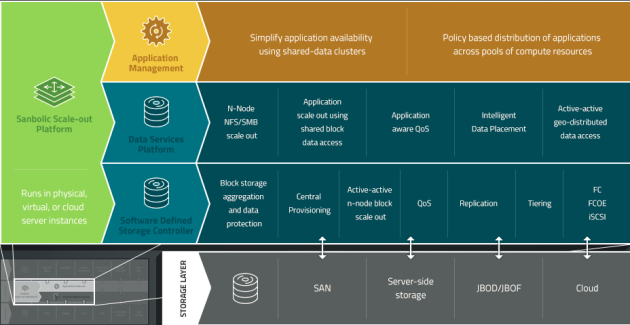While cloud datacenters like Google and Amazon have been using server attached storage for a while, enterprises are slowly starting to see the advantages of it. Costs, the ability to scale capacity and performance and simplicity of management are just a few of the benefits.
Many Software Defined Storage (SDS) solutions have emerged the last three years or so. To name some: VMware Virtual SAN, Nutanix, Maxta MxSP, SimpliVity and Scale Computing.
Sanbolic enters this market now as well with a solution named Scale-Out Platform. It cannot be compared however to the other SDS solutions named at the start of this blog. Those are relative simple: take a bunch of local disks in a server, aggregate those by software running either in the hypervisor kernel or in a virtual machine, distribute the data over mutliple nodes for availability and present volumes.
These solutions are silos just like traditional SAN or NAS boxes. They each require a different skill set, have different features and management tools.
Sanbolic Scale-Out Platform can be seen as an aggregation of both local storage plus legacy SAN storage (EMC, NetApp, Hitachi Data Systems) as well as cloud storage (Amazon Web Services) managed as a single resource by software using a single management console.
On top of the aggregated physical storage a filesystem layer can be used. This filesystem is the next release of Melio FS which has been around for quite some time.Melio presentes volumes using CIFS/SMB or NFS.
Melio FS is an advanced , multi-node clustered filesystem offering features like Quality of Service per VM or even per file. It is very scaleable. Melio’s 64 bit architecture supports 2000 physical or virtual nodes and up to 18 million terabyte file system sizes. Volumes can be mirrored for redudancy with seamless failover. A full list of features is here.
Sanbolic software defined storage controller supports Windows, Linux, Xen, KVM, Hyper-V and OpenStack. Surprisingly it does not support VMware vSphere.
An overview of all the features can be found here.


